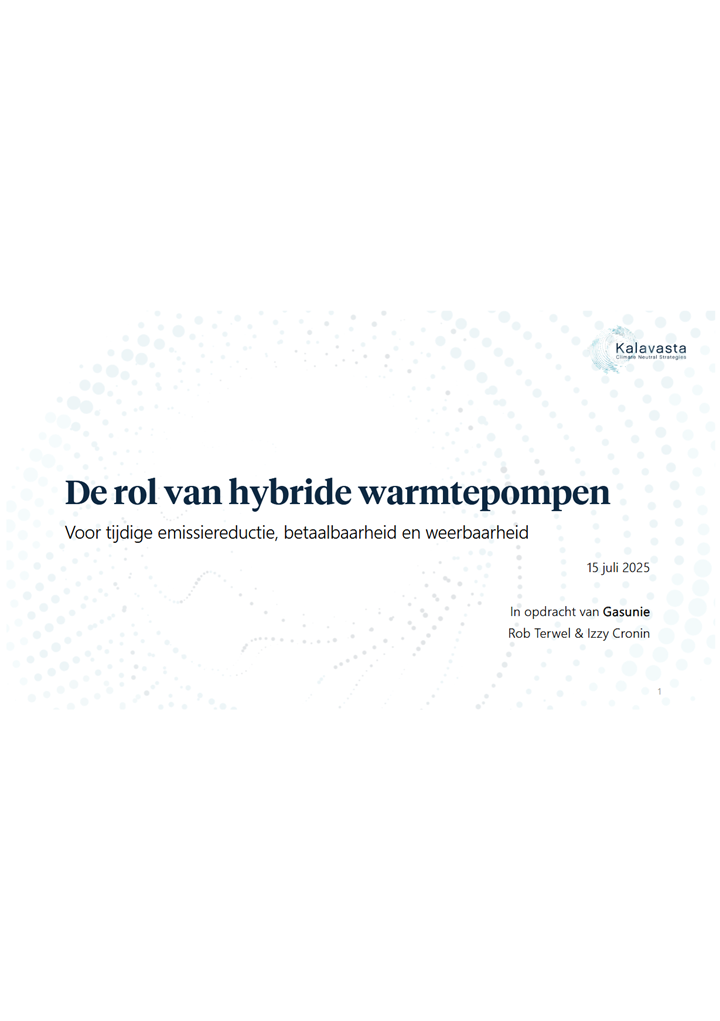The role of hybrid heatpumps

Hybrid heat pumps emerge as an essential technology for closing the emission reduction gap for the 2030 climate targets in the residential sector. While fully electric heat pumps and district heating networks can address part of the challenge, their combined technical potential based on natural replacement moments of boilers is insufficient to meet the entire additional reduction target. Hybrid heat pumps can fill this gap because they are suitable for a much broader range of existing homes, including those with moderate insulation levels. They require fewer building modifications compared to fully electric alternatives, making them deployable at the scale and speed necessary to achieve the climate objectives. When operating on climate-neutral gas such as green gas, hybrid heat pumps can become completely emission-free while maintaining their practical advantages for existing housing stock.
The practical advantages of hybrid heat pumps make them particularly suitable for rapid deployment in existing housing. Unlike fully electric heat pumps, hybrid systems typically require no extensive building modifications and can be installed in homes with varying insulation levels. This means homeowners can improve their heating systems without undertaking major renovation projects or waiting for natural moments to upgrade insulation. The technology is reusable and adaptable, allowing for future adjustments as individual circumstances or the broader energy system evolves. Insulation improvements can be made at more natural moments rather than as a prerequisite for heating system upgrades. This flexibility in implementation timing and requirements makes hybrid heat pumps a pragmatic solution for achieving emission reductions at the scale and speed demanded by climate objectives, while maintaining affordability and convenience for homeowners.
From the consumer perspective, hybrid heat pumps often represent the most cost-effective option for reducing emissions from home heating. For households with average or below-average natural gas consumption, the annual costs of operating a hybrid heat pump are lower than maintaining a conventional gas boiler, and they compare favorably to other sustainable heating alternatives. This economic advantage stems from the technology's ability to intelligently switch between electricity and gas based on operational efficiency and cost considerations. A substantial portion of Dutch households with gas heating have consumption levels that make the transition to a hybrid heat pump financially beneficial. The investment pays back through lower operational costs, making this technology accessible without requiring homeowners to accept higher expenses for sustainability. This affordability factor is crucial for achieving widespread adoption at the pace required by climate goals.
Looking beyond individual household economics to the broader energy system, hybrid heat pumps can deliver significant cost savings at the national level. Analysis of future energy scenarios shows that homes equipped with hybrid heat pumps can achieve lower total system costs compared to those relying solely on electric heat pumps. This advantage becomes particularly apparent when considering the complete picture including electricity grid infrastructure, heat pump equipment, energy consumption, and building insulation requirements. The savings arise because hybrid systems reduce peak loads on the electricity network and leverage existing gas infrastructure, thereby avoiding or deferring costly electricity grid reinforcements. When climate-neutral gas becomes available in the energy system, hybrid heat pumps can serve as a carbon-neutral end solution while maintaining these economic benefits. The cumulative national savings from widespread hybrid heat pump deployment could amount to hundreds of millions of euros annually.